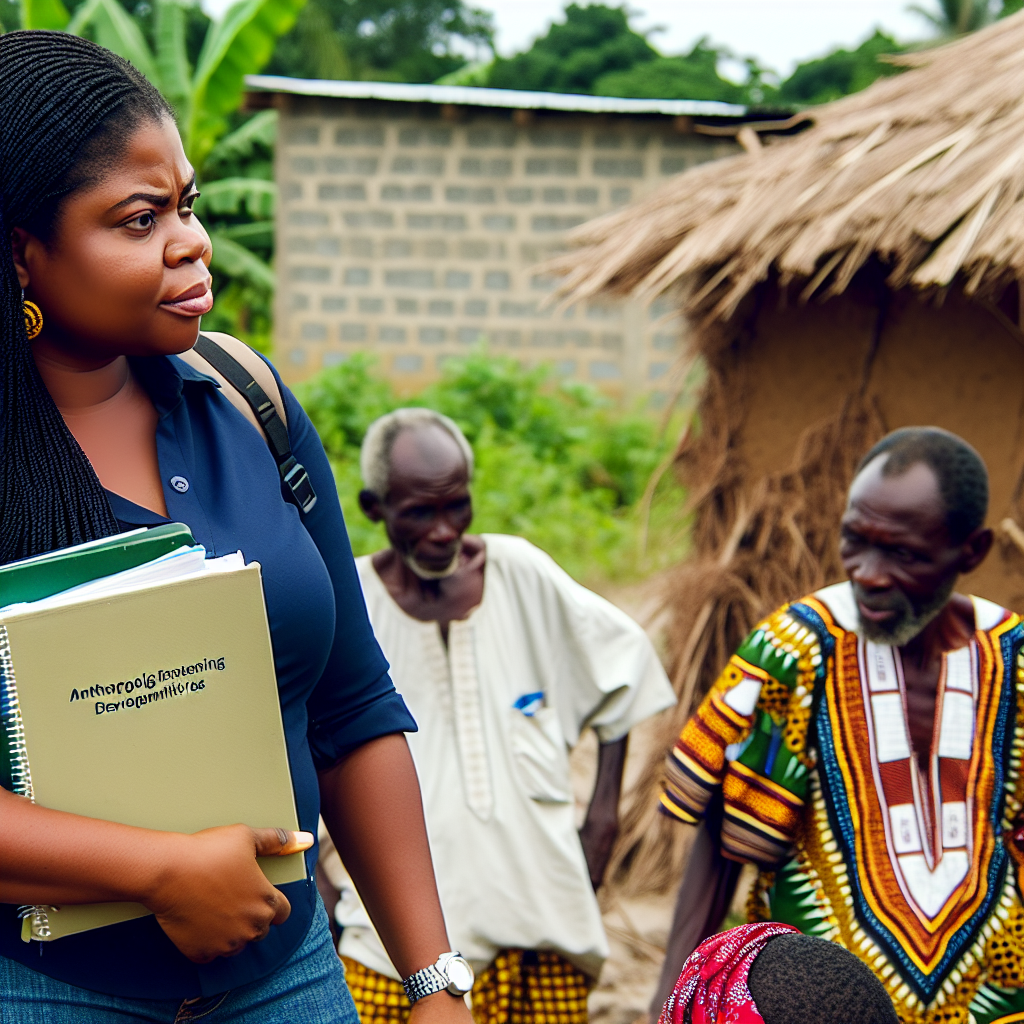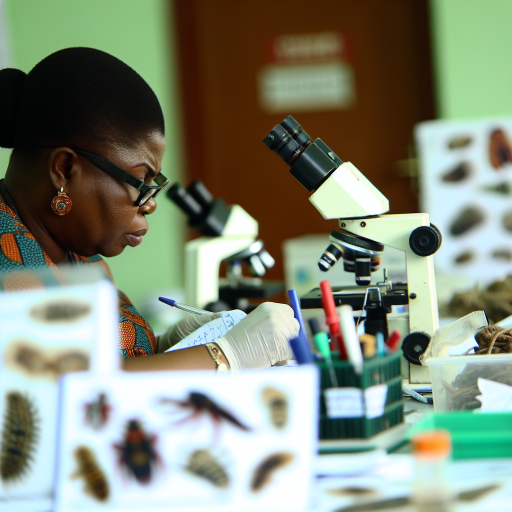Introduction
Anthropology is the study of human societies and cultures.
Nigeria faces challenges such as poverty, healthcare, education, and infrastructure.
Understanding cultural practices and beliefs is crucial for successful development projects.
Anthropologists play a key role in researching and understanding diverse cultural perspectives.
Their insights help in creating sustainable and inclusive development strategies for Nigeria.
By working closely with local communities, anthropologists can identify barriers to development progress.
Cultural competence is essential to avoid imposing Western ideologies that may not align with local values.
Anthropology provides a holistic approach to development in Nigeria.
Through cultural understanding, sustainable solutions can be implemented to address various challenges.
Anthropologists play a crucial role in conducting research and collecting data on local cultures and traditions in Nigeria.
Through their fieldwork, they immerse themselves in the community.
They observe customs, rituals, and social structures.
- Anthropologists gather data through participant observation, interviews, and surveys, giving them an in-depth understanding of the complexities of Nigerian societies.
- They document cultural practices, belief systems, and kinship structures, providing valuable insights into the foundation of communities and their dynamics.
- This information is essential in informing development policies and programs as it helps policymakers understand the needs and aspirations of the local population.
- By studying local cultures, anthropologists can identify potential challenges and opportunities for development initiatives, ensuring that interventions are culturally sensitive and relevant.
Ultimately, anthropological research and data collection contribute to the sustainable and inclusive development of Nigeria by grounding policies in the realities of local communities.
Cultural Sensitivity and Respect
Development practitioners must be culturally sensitive to the traditions and values of local communities.
It is essential to understand and appreciate the customs and beliefs of the people being served.
Anthropologists can play a significant role in promoting cultural sensitivity and respect in development projects.
By working closely with local communities, anthropologists can help identify cultural norms and practices that should be considered in development initiatives.
Respecting the unique cultural identities of communities is crucial for the success and sustainability of development projects.
Anthropologists can provide vital insights into how to tailor development interventions to align with local customs and beliefs.
They can help bridge the gap between modern development approaches and traditional practices, ensuring better integration and acceptance.
By fostering mutual understanding and collaboration between development practitioners and local communities, anthropologists can facilitate more effective and sustainable development outcomes.
Cultural sensitivity and respect are fundamental principles that should guide development efforts in Nigeria, and anthropologists are well-positioned to promote these values.
Explore Further: Environmental Impact of Ship Building in Nigeria
Community engagement and participation
- Anthropology plays a crucial role in facilitating community engagement and participation in development projects.
- Anthropologists work closely with local communities to understand their needs, values, and practices.
- By building trust and rapport, anthropologists can encourage community members to actively participate in decision-making processes.
- By involving local communities in development projects, there is a sense of ownership and pride in the outcomes.
- Local knowledge and expertise are invaluable assets that can contribute to the success and sustainability of development initiatives.
- Community participation ensures that projects are culturally appropriate and sensitive to the needs of the people.
- When communities are actively engaged, there is a greater likelihood of long-term success and positive impact.
The benefits of involving local communities in decision-making processes
- Empowerment: Involving community members in decision-making empowers them to take control of their own development.
- Ownership: Communities that are involved in project planning and implementation feel a sense of ownership and responsibility.
- Local expertise: Local communities possess invaluable knowledge and expertise that can inform and improve development projects.
- Sustainability: Projects that engage local communities are more likely to be sustainable in the long run.
- Cultural sensitivity: Involving communities ensures that projects are culturally sensitive and respectful of local customs and traditions.
- Partnership: Working collaboratively with local communities fosters a sense of partnership and mutual respect.
- Impact: When communities are actively engaged, the impact of development projects is more significant and meaningful.
You Might Also Like: Animal and Environmental Biology Student Experiences
Impact Assessment and Evaluation
Anthropologists play a crucial role in evaluating the impact of development projects on local cultures and societies.
By utilizing their ethnographic research skills, they are able to provide valuable insights into how these projects affect the social fabric of a community.
- Anthropologists conduct in-depth interviews with community members to understand their perspectives on development projects.
- They observe and participate in local rituals, ceremonies, and daily activities to assess the changes brought about by development interventions.
- Anthropologists analyze the economic, social, and environmental impacts of development projects on the community.
- They identify unintended consequences of development initiatives that may have negative effects on local cultures and traditions.
This information gathered by anthropologists through impact assessment and evaluation can help improve future development interventions in several ways.
- It allows policymakers and development practitioners to make informed decisions based on the needs and priorities of the local community.
- By understanding the cultural context of a community, development projects can be tailored to better align with local customs and traditions.
- Anthropological insights can lead to the redesign of programs to mitigate negative impacts and enhance the positive outcomes for the community.
- Long-term monitoring and evaluation conducted by anthropologists help track the progress and sustainability of development projects over time.
The role of anthropologists in evaluating the impact of development projects on local cultures and societies is vital for creating sustainable and inclusive development interventions.
You Might Also Like: Chemical Engineering vs. Chemistry Degrees

Conflict resolution and peacebuilding
Anthropology plays a vital role in understanding and addressing intercultural conflicts in Nigeria.
It provides insights into the root causes of conflicts.
Through ethnographic research, anthropologists can identify underlying cultural norms, values, and beliefs.
These factors contribute to conflicts between different ethnic groups in the country.
Anthropologists also serve as cultural mediators.
They facilitate communication and dialogue between conflicting parties.
Their deep understanding of local cultures allows them to bridge gaps.
Such efforts foster mutual understanding.
This leads to more effective conflict resolution processes.
Transform Your Career with Expert Guidance
Get personalized mentorship consulting that’s tailored to your unique path. Our expert advice is actionable and exclusive.
Get StartedBy conducting participatory research, anthropologists can involve all stakeholders in peacebuilding efforts.
This ensures that local voices are heard and respected.
This inclusive approach helps build trust and collaboration among communities.
It lays the foundation for sustainable peace.
Anthropologists can also contribute to peacebuilding.
They develop culturally sensitive conflict resolution mechanisms.
By incorporating traditional dispute resolution practices into formal processes, anthropologists create solutions.
These solutions resonate with local communities.
Consequently, they are more likely to be accepted and implemented.
In addition, anthropologists advocate for the protection of cultural heritage and traditions during conflicts.
By highlighting the importance of cultural preservation, they help preserve the identity of affected communities.
This fosters reconciliation and healing.
The role of anthropology in conflict resolution and peacebuilding in Nigeria is essential.
It creates lasting peace and stability in the country.
By leveraging their expertise in cultural understanding and mediation, anthropologists contribute valuable insights.
These strategies promote harmony and reconciliation among diverse groups.
Find Out More: Agricultural Economics Journals in Nigeria
Importance of Anthropology in Nigerian Development
We have explored the essential role of anthropology in Nigerian development.
Anthropologists play a crucial role in understanding cultural dynamics.
They provide insights that can inform policies and programs.
This helps address societal challenges effectively.
Anthropology contributes to sustainable development by promoting cultural sensitivity.
Community participation in development processes is vital.
It helps create interventions that are contextually relevant.
These interventions are sustainable in the long run.
Collaboration is key between anthropologists and development practitioners.
This collaboration is essential for successful project implementation.
Encouraging further research in anthropology is crucial.
This research deepens our understanding of Nigerian societies.
Collaboration between anthropologists, policymakers, and community members can lead to impactful initiatives.
Working together can create positive change in Nigeria.
Promoting sustainable development is a shared goal.
Additional Resources
Understanding gender issues in Nigeria: the imperative for …




